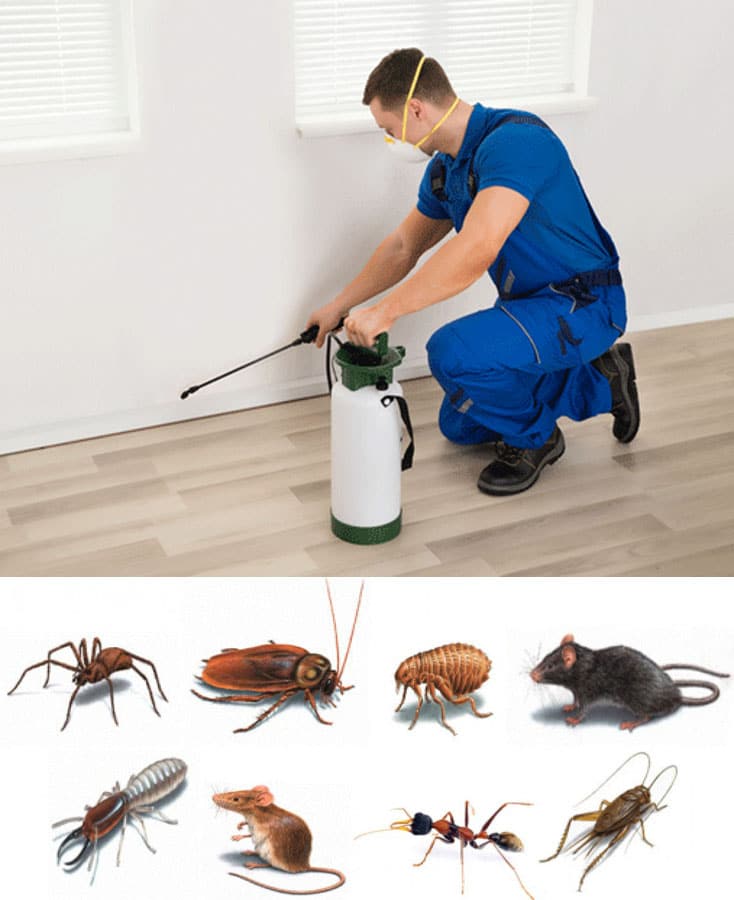Relied On A1 Exterminator Charlotte NC - Comprehensive Pest Solutions
Relied On A1 Exterminator Charlotte NC - Comprehensive Pest Solutions
Blog Article
Bed Bug Therapy Failure: Contrasting Chemical Vs. Non-Chemical Solutions
In the world of insect control, specifically when taking care of the persistent concern of bed bugs, the option between chemical and non-chemical therapy remedies can be a crucial one. Both methods supply distinct benefits and drawbacks, influencing aspects such as effectiveness, safety factors to consider, and overall expense. By analyzing the nuanced information of each method, a clearer understanding of which path to go after in attending to a bed pest infestation can be obtained.
Performance of Chemical Treatments
Chemical therapies for bed insect problems have actually been extensively recognized for their fast and powerful efficacy in eliminating these pests. When thinking about the efficiency of chemical treatments, it is important to recognize that they can give a quick and thorough option to a bed insect problem. Expert pest control experts often rely on insecticides to target bed insects at different phases of their life process, consisting of eggs, nymphs, and adults. These chemicals typically work by disrupting the bed bugs' nerves, causing paralysis and ultimate death.
Moreover, chemical therapies have the advantage of using residual results, implying that they can proceed to remove bed pests even after the first application. This residual activity is specifically valuable in combating any type of potential re-infestations. Furthermore, the fast action of chemical therapies can bring relief to people facing extreme bed pest problems, enabling them to regain control of their space swiftly.
Safety And Security Interest In Chemical Solutions
One important aspect that calls for cautious factor to consider when using chemical services for bed insect therapy is ensuring the safety of residents and the atmosphere. Exposure to particular chemicals utilized in bed bug treatments can lead to respiratory system issues, skin irritability, or other adverse responses, specifically in individuals with pre-existing problems or sensitivities.
Moreover, the ecological effect of chemical solutions is an additional considerable consideration. Some chemicals utilized in bed pest treatments might be unsafe to valuable insects, wild animals, and ecosystems if they seep into the dirt or water systems. It is necessary to use chemical treatments judiciously, complying with safety and security guidelines, and taking into consideration much less hazardous options to reduce these threats and guarantee the reliable and safe administration of bed pest problems.
Advantages of Non-Chemical Approaches
Taking into consideration the possible safety and security worries and environmental effect linked with chemical options for bed insect treatment, discovering non-chemical strategies presents an encouraging option with a number of distinct advantages. Non-chemical therapies are ecologically friendly, as they do not add to air or water contamination, making them a sustainable selection for bug control.
In addition, non-chemical services can be reliable in targeting bed bugs, consisting of hard-to-reach locations where chemical treatments may not pass through - A1 charlotte bed bug exterminator. Methods such as warmth therapy, vacuuming, heavy steam cleansing, and mattress coverings give complete removal without the use of damaging chemicals.
Limitations of Non-Chemical Treatments

Furthermore, non-chemical treatments commonly require several applications to attain effective elimination. This can be time-consuming and might not constantly guarantee complete removal of all bed bugs and their eggs, especially in hard-to-reach or hidden areas.
Moreover, the success of non-chemical therapies heavily counts on correct implementation and thoroughness, which can be testing for people without expert competence. Poor application of non-chemical methods may cause insufficient eradication, causing relentless problems and the need for extra treatments.
As a result, while non-chemical therapies have their advantages, it is important to recognize these limitations and consider them when figuring out one of the most reliable technique for handling bed insect problems.
Price Contrast: Chemical Vs. Non-Chemical Options
Offered the constraints linked with non-chemical therapies, an important element to examine in the context of bed insect administration is the expense comparison between chemical and non-chemical choices. Chemical treatments normally include the application of insecticides by professionals, which can range from $250 to $900 per space, depending upon the seriousness of the infestation and the size of the area to be dealt with. On the other hand, non-chemical treatments like heat therapy or vapor can be extra pricey, with expenses ranging from $1,000 to $6,000 for an entire home. While the initial cost of chemical therapies might seem lower, several treatments may be called for to totally remove the invasion, potentially raising the general cost. On the various other hand, non-chemical alternatives might offer a more sustainable and environmentally friendly solution, although they can be cost-prohibitive for some people. Ultimately, when thinking about the expense of bed insect treatment choices, it is essential to weigh the upfront expenses versus website link the effectiveness and lasting sustainability of the selected approach.
Final Thought

Taking into consideration the prospective safety worries and environmental effect linked with chemical options for bed bug treatment, discovering non-chemical approaches provides an encouraging alternative with numerous distinctive benefits.Provided the constraints associated with non-chemical therapies, a vital facet to evaluate in the context of bed insect monitoring is the cost contrast between chemical and non-chemical choices. In comparison, non-chemical therapies like heat treatment or steam can be much more costly, with prices varying from $1,000 to $6,000 for a whole home. While the initial price of chemical therapies might seem lower, multiple therapies may be needed to completely get rid of the infestation, potentially boosting the total expense.In verdict, when comparing chemical and non-chemical bed bug treatment options, it is crucial to consider performance, safety, benefits, constraints, and expense.
Report this page